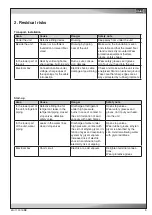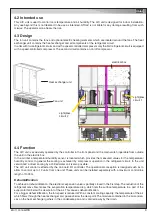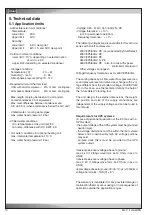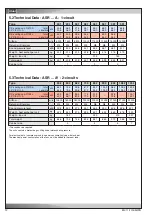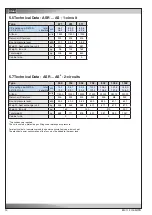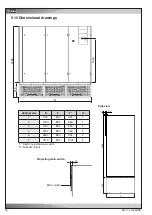
4
/11.2015/
DX
EN
- Responsability for correct disposal of refrigerant and system parts is incumbent on the operator.
- Refrigerants have a narcotic effect when inhaled in high concentrations.
- The room is to be evacuated immediately if high concentrations of refrigerant suddenly occur. The room may only
be entered again after adequate ventilation.
- If unavoidable work is required in the presence of a high concentration of refrigerant, breathing apparatus must
be worn. This does not mean simple filter masks. Comply with breathing protection data sheet.
- Safety glasses and safety gloves are to be worn.
- Do not eat, drink or smoke at work.
- Liquid refrigerant must not get onto the skin (risk of burns).
- Only use in well ventilated areas.
- Do not inhale refrigerant vapours.
- Warn against intentional misuse.
- It is absolutely essential to comply with the first aid measures if accidents occur.
- Refrigerants containing FCs contribute to the global warming and with this to climate changes. The FCs must
therefore be disposed of in accordance with the regulations, i.e. only by companies specially qualified and licensed
as recognised disposal companies for refrigerants.
1.4 Safety and environmental requirements
The following requirements relate to the operation of refrigerating plants within the European Community.
- The used components must correspond to the pressure equipment guide-line EC/97/23 and EN 378 part 1-4.
- Independent of the design, the equipment and inspection before the delivery, also the operator of such plants has
duties according to EN 378 and national regulations.
This concerns the installation, the operation and the repeated inspection:
- Installation: according to EN 378
- Operation: Determination of emergency measures (accidents, malfunctions)
Creation of an abbreviated instruction and notification (template page)
a. A unit protocol must be kept.
b. To be stored in the proximity of the unit
c. Access for competent staff in case of repairs and repeated inspection must be ensured.
- Repeated inspection: according to EN 378
The operator is responsible for the execution.
The operator must ensure that all maintenance, inspection and assembly work is carried out by authorised and
qualified specialist staff who have made an in-depth study of the operating instructions.
It is absolutely essential to comply with the procedure for shutting down the system described in the operating in-
structions. Before maintenance work, the unit must be switched off at the main switch and a warning sign displayed
to prevent unintentional switching-on.
First aid measures
- If health problems occur during or after handling fluorinated hydrocarbons, a doctor is to be consulted immediately.
The doctor is to be informed that the work involved the use of fluorinated hydrocarbons.
- In the case of acute effects, the casualty is to be brought into the fresh air as quickly as possible.
- Splashes of fluorinated hydrocarbons in the eyes can be blown out or fanned out by an assistant. Then rinse with
water.
Independent conversion and manufacture of replacement parts
The system may only be converted or modified after consultation with STULZ. Original replacement parts and re-
placement parts/accessories authorised by STULZ are an aid to safety.
Unacceptable operating methods
The operating safety of the system is only guaranteed when it is used as intended. The limit values stipulated in the
technical data must not be exceeded under any circumstances.





